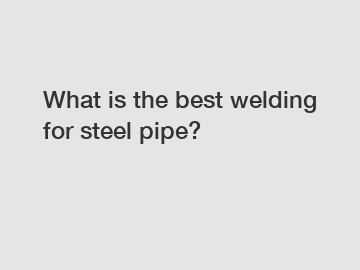What is the best welding for steel pipe?
What is the best welding for steel pipe?
When it comes to welding steel pipes, there are several methods to choose from. Each method has its advantages and disadvantages, and the best welding technique for steel pipes largely depends on the specific requirements of the project. In this article, we will explore some of the most commonly used welding techniques for steel pipes and discuss their pros and cons.
1. Shielded Metal Arc Welding (SMAW).

Shielded Metal Arc Welding, also known as stick welding, is one of the oldest and most widely used welding techniques. It involves the use of a consumable electrode coated in flux. The heat generated by an electric arc melts the electrode, creating a molten pool that fuses the steel pipes together.
SMAW is highly versatile and can be used for welding pipes of various sizes and thicknesses. It is also suitable for outdoor and on-site applications since it does not require a shielding gas. However, SMAW can be a slower process compared to other techniques, and the slag produced during welding needs to be removed, increasing post-weld cleanup efforts.
2. Gas Metal Arc Welding (GMAW).
Gas Metal Arc Welding, commonly referred to as MIG welding, utilizes a continuously fed wire electrode and a shielding gas, usually a mixture of argon and carbon dioxide. The electric arc heats the wire, melting it, and creating a weld pool. This method is known for its speed and ease of use.
GMAW is popular for industrial applications because it allows for a high level of productivity. It provides excellent weld quality and requires minimal post-weld cleanup. However, this technique may not be suitable for thin-walled pipes due to the high heat input, which can cause distortion or burn-through.
3. Flux-Cored Arc Welding (FCAW).
Flux-Cored Arc Welding is similar to GMAW but uses a tubular electrode filled with flux instead of a solid wire. This self-shielding or gas-shielded process eliminates the need for an external shielding gas. FCAW offers high deposition rates and deep penetration, making it ideal for thick-walled pipes.
FCAW is known for its ability to weld steel pipes even in less than ideal conditions, such as dirty or rusty surfaces. The flux in the electrode provides excellent protection against impurities. However, the fumes produced during FCAW can be hazardous, requiring proper ventilation and personal protective equipment.
4. Gas Tungsten Arc Welding (GTAW).
Gas Tungsten Arc Welding, commonly known as TIG welding, is a precise and versatile technique suitable for both thin and thick steel pipes. It uses a non-consumable tungsten electrode and a separate filler material if required. A shielding gas, often argon, protects the weld zone from atmospheric contamination.
TIG welding produces high-quality welds with excellent aesthetic appearance. It offers precise control over heat input, making it suitable for welding pipes with complex geometries or materials vulnerable to distortion. However, TIG welding is a slower process compared to other methods, and it requires a high level of skill and expertise.
In conclusion, there is no one-size-fits-all answer to determine the best welding technique for steel pipes. It depends on various factors such as pipe thickness, application requirements, and available equipment. Shielded Metal Arc Welding (SMAW), Gas Metal Arc Welding (GMAW), Flux-Cored Arc Welding (FCAW), and Gas Tungsten Arc Welding (GTAW) are some of the most commonly used methods, each with its own strengths and limitations.
Ultimately, selecting the best welding technique requires careful consideration of the project's specific needs and the experience of the welder. Consulting with industry professionals and conducting test welds can help ensure the optimal method is chosen for welding steel pipes effectively and efficiently.
For more cnc induction hardening equipment, straight seam steel pipe welder factory, induction heat treatment machineinformation, please contact us. We will provide professional answers.


